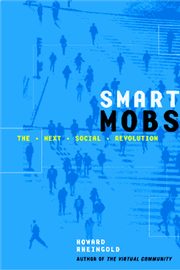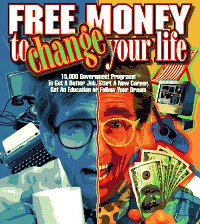| Friday, February 7, 2003 |  |
|
|
|

In times of change it can be useful to look back at other times of cultural change, at least those that can be considered successful in retrospect. The Renaissance was one of those periods. 'Renaissance', is French for 'rebirth'. It describes the intellectual and economic changes that occurred in Europe from the fourteenth through the sixteenth centuries. Europe emerged from the stagnation of the Middle Ages and experienced an age of artistic, social, scientific and political innovation and new thought, as well as financial growth.
The Renaissance is usually considered to have originated in Florence, Italy. Fifteenth-century Florence was a self-governed, independent city-state. The basis of its economic success was its twelve artist guilds that regulated the trades. Wealthy guild members held position in government and were very influential in both society and politics. Because of its strong economy and a political philosophy that was dedicated to the welfare of the city, Florence thrived. The Florence banking business was also a foundation for its success. The Florentine gold coin known as the florin was of such reliable purity that it became the standard coinage throughout Europe.
Many factors contributed to the emergence of the Renaissance throughout Europe:
Gutenberg invented the printing press in 1445, which made it possible to more widely read about philosophy and science, and the stranglehold of the church was diminished. And people started to read 'classics', texts from ancient Greece and Rome, which had been completely ignored for centuries. That inspired a re-cycling and re-invention of good things from many sources.
Improvements in navigation and map making made it possible to travel farther than before, and there was a lively trade, bringing in exotic spices and gems and fabrics from foreign lands.
Architecture was inspired by the ancient Greeks and Romans, and by newfound mathematical principles, and a fascination for harmonious proportions, the golden mean, symmetry.
There were also many negative factors that have inspired the need for an explosion of innovation. Europe had been devastated by the plague, kept in the dark by the church, and life had just been hard work and misery for most people.
Any of that we can use today? Well, it was about bringing in many different new and old influences. It was about an increased ability to communicate information in writing. It was about advances in science that made it possible to understand the world better. It was about incrased ability to trade. It was about versatile geniuses who were both artists, scientists, philosophers, architects and politicians, who would weave these many influences together. ...All of which might very well apply to our situation now, with the Internet, and suddenly increased facilities for interacting with cultures and with knowledge we were isolated from before.
Here are some references on the Renaissance: [link] [link] [link] [link] [link].
[ Culture | 2003-02-07 14:45 | | PermaLink ] More >
|
|
| Tuesday, February 4, 2003 |  |
|
|
|
 Doc Searls quotes Brent Ashley: Doc Searls quotes Brent Ashley:"What pervasaive meme can we come up with that will be strong enough to counter the powerful theft/piracy images? Let's all blog aloud and get the juices flowing, shall we?
Ownership of physical property implies exclusive use. I own my lawn mower, it's in my posession, in order for you to use it I must relinquish its use to you. You shouldn't loan it to your neighbour in turn without my permission, especially as that extends my inability to make use of it. If you take it from me, I am left without its use altogether. I can ask to be compensated for the loss. I lose a physical entity, and therefore control over its use.
Ownership of intellectual property does not imply exclusive use. You can play my music without depriving me of it. You can loan it to someone else without affecting my use, although you should ask my permission. I never lose my ability to have full use of the work. What I lose when you use my work without my permission or recompense is control over its use.
Obviously these are two very different concepts. Yet they're both called ownership . Concepts of theft and piracy of intellectual property just don't fit. How have such ill-fitting analogies come to permeate our conciousness?" I have some strong things to say about ownership, when I have some time, so later.
[ Culture | 2003-02-04 18:23 | | PermaLink ] More >
|
|
| Sunday, February 2, 2003 |  |
|
|
|
User Not Found is a weblog by Dana J. Robinson, devoted to dealing with the death of online friends. Here, from a piece called 'Not knowing is the hardest':"Given the nature of communicating online, one person's failure to log on for days, weeks or months at a time can cause concern in the people who continue to log on regularly. It's especially worrisome when the person who isn't signing on was living with a known illness. While "killing" online personas happens all the time, the real tragedy occurs when a real life death happens and is chalked up to a person just not logging on anymore." Hm, indeed. How do we know? I can think of online friends who've died where it was only very coincidental that their other online friends heard about it. For one it was only because a family member was so bright and knowledgable to go and send an e-mail to her whole contact list. For another, I didn't know before several years later that he died. It would be nice if we could engage in networks of trust tight enough so that we quite naturally would file next of kin information with others in the network, so that we'll never just disappear without an explanation. Or, maybe, a deadman's switch, which releases certain kinds of contact information if we haven't logged in for some length of time.
[ Culture | 2003-02-02 23:26 | | PermaLink ] More >
|
|
| Friday, January 31, 2003 |  |
|
|
|
 Technology Review compares science fiction visions with the concepts Howard Rheingold talks about in his book "Smart Mobs" and the website with the same name. 'Global Frequency' is a new comic book series by Warren Ellis: Technology Review compares science fiction visions with the concepts Howard Rheingold talks about in his book "Smart Mobs" and the website with the same name. 'Global Frequency' is a new comic book series by Warren Ellis:"Set in the near future, Global Frequency depicts a multiracial, multinational organization of ordinary people who contribute their services on an ad hoc basis. As Ellis explains, "You could be sitting there watching the news and suddenly hear an unusual cell phone tone, and within moments you might see your neighbor leaving the house in a hurry, wearing a jacket or a shirt with the distinctive Global Frequency symbol...or, hell, your girlfriend might answer the phone...and promise to explain later...Anyone could be on the Global Frequency, and you'd never know until they got the call." Ellis's story responds to significant shifts in the media environment — in particular the increasing role of mobile phones and wireless computing - but also to speculations about their social and political impact." And then listen to how Rheingold defines Smart Mobs:"Smart mobs consist of people who are able to act in concert even if they don't know each other. The people who make up smart mobs cooperate in ways never before possible because they carry devices that possess both communication and computing capabilities.... Groups of people using these tools will gain new forms of social power." Like we're all part of the underground. We're able to act in concert, but our organization is invisible, and there's nobody in charge who can be bought.
[ Culture | 2003-01-31 23:59 | 0 comments | PermaLink ]
|
|
| Saturday, January 25, 2003 |  |
|
|
|
 Greater Democracy quotes an Independence Day Manifesto that Allen Ginsberg wrote in 1959. It begins: Greater Democracy quotes an Independence Day Manifesto that Allen Ginsberg wrote in 1959. It begins:"Recent history is the record of a vast conspiracy to impose one level of mechanical consciousness on mankind and exterminate all manifestations of that unique part of human sentience, identical in all men, which the individual shares with his Creator. The suppression of contemplative individuality is nearly complete.
The only immediate historical data that we can know and act on are those fed to our senses through systems of mass communication.
These media are exactly the places where the deepest and most personal sensitivities and confessions of reality are most prohibited, mocked, suppressed.
At the same time there is a crack in the mass consciousness of America -- sudden emergence of insight into a vast national subconscious netherworld filled with nerve gases, universal death bombs, malevolent bureaucracies, secret police systems, drugs that open the door to God, ships leaving Earth, unknown chemical terrors, evil dreams at hand.
Because systems of mass communication can communicate only officially acceptable levels of reality, no one can know the extent of the secret unconscious life. No one in America can know what will happen. No one is in real control. America is having a nervous breakdown... " [more] And, as David Weinberger poignantly comments:"Now we have new cracks in the broadcast stranglehold on what we know and what we count as interesting. We have one another, unmediated, through the Internet. The Internet should be America's nervous breakdown. And not a moment too soon." Yes, indeed. It is too late to put the genie back in the bottle, so it should indeed make somebody very nervous that we actually can sit here and share information at will, largely unrestrained. Some of us might even wake up and start thinking for ourselves.
[ Culture | 2003-01-25 23:01 | | PermaLink ] More >
|
|
| Thursday, January 23, 2003 |  |
|
|
|
Phil Wolff:Through the black, a flash of unexpected light. BART's Transbay Tube runs under the San Francisco Bay. Connecting Oakland to The City by tunneling through dark, deep brine. Your next time through, peer into the dark. Even at 70 miles per hour you may glimpse the phantom station mid-way through the eight mile submergence. No one's talking about it. Is it an abandoned construction site, peopled by the homeless? A cold war bunker? A cancelled connection to the old Treasure Island Navy base? An exclusive night club with an unbeatable underwater view? A biowar research lab, isolated for the next Andromeda strain? A deep sea diving platform, the better to find jumpers who preferred the Bay Bridge to the Golden Gate? An archaelogical site, continuing a 40 year investigation into an alien wreck uncovered by Bechtel during construction? The next time a BART train blows through your station without picking up passengers, remember this. It could be on the way to the mystery stop." I just love abandoned underground stuff.
[ Culture | 2003-01-23 23:45 | 0 comments | PermaLink ]
|
|
|
|
 "Most everybody is overwhelmed. And they respond with various defense mechanisms. Denial, isolation, increased greed ('I'll get it while I can'), righteousness ('It's their own fault'). There are a whole set of mechanisms that people use to keep from being open, because the quality of the human heart uncontrolled by the mind is that it will give away everything... We have to find ways to exercise the compassion of our hearts, and at the same moment learn how to know what the limits are and be able to say no without guilt." -- Ram Dass Jon Husband mentioned that quote. Indeed, I think it is a well-kept secret that most people are overwhelmed by life at this point. It didn't used to be like that. The world has sped up. Things are accelerating. Most people can't really keep up. Sometimes I think that it is just me, and that the people around me are just standing around waiting for me to get my act together. Until I look a little deeper and realize that most people I know are so thoroughly busy keeping up with their own lives that they don't have much time to stand around and philosophize about what I am not getting done. Nobody seems to have any time left over after doing what they need to do. Because they're not done doing what they need to do.
Fundamentally I think it is a good and useful thing. An evolutionary trigger. See, if there isn't time enough to get everything done, you have to learn to prioritize and to be more discerning about what you do, and what not to do. And it is inevitably leading towards that you'll choose to do the things that you most feel you need to do, the essential stuff - what is most vital. And you'll choose to do what is exciting, rather than what is boring. I mean, if I can't do everything anyway, why on earth would I choose to do the boring stuff, and leave the exciting stuff undone.
But, when we're put under pressure, apparently being asked to do more things than what appears to be humanly possible, it brings up a whole bunch of feelings and reactions from the bottom of our psyche. We might temporarily escape the problem by coercing others into doing more things for us. We might put on blinders, and start ignoring a larger portion of life. We might deny it altogether, and pretend that our life is perfectly in order, all organized, relaxed and secure. We might hold on to the way things used to be.
Ultimately I think it is about learning to both be very open and flexible, and at the same time very discerning and precise. Be open to everything that the universe blows by your nose, but don't assume that you're supposed to analyze and package all of it. That's impossible. Just be open to it. You can watch the leaves blowing off the trees, and find it beautiful, without having to collect or count each single leaf.
There's plenty of time for that which is most essential. The time is always NOW, and there's never more or less of now. So, of course you have time enough for doing what you're doing right now. You just have to give up the idea that you SHOULD be doing something else than what you're doing. Do what you need to do. Don't do everything else.
[ Culture | 2003-01-23 18:12 | | PermaLink ] More >
|
|
| Tuesday, January 14, 2003 |  |
|
|
|
 Britt Blaser says some very interesting things about money and capitalism, which I'm trying to wrap my mind around. He says we're watching the death throes of what he calls "Managerial Capitalism", which I agree with. And he also seems to feel that a more grassroots kind of self-organizing, reputation based kind of economy ought to replace it, which I also agree with. And then he says: Britt Blaser says some very interesting things about money and capitalism, which I'm trying to wrap my mind around. He says we're watching the death throes of what he calls "Managerial Capitalism", which I agree with. And he also seems to feel that a more grassroots kind of self-organizing, reputation based kind of economy ought to replace it, which I also agree with. And then he says:"Money is Free. Get Used To It." You know, Managerial Capitalism is based on a shortage of capital. I.e. capital is necessary, but there's never quite enough of it, so those who control it have the upper hand. But nowadays, at least in a place like the U.S., excess credit seems to be thrown at you. You can buy cars with 0% financing, and furniture or washing machines you don't have to start paying before a year or more later. So, capital is going towards being free. And governments that try to stimulate the economy will often, like Bush, do it by giving tax breaks to the rich, in the hope that they'll put the money into enterprises that do stuff. Except for that those enterprises don't really do the right stuff. And, ironically, if capital moves towards being free (freely available), then capitalism is on its way out, because there is no longer a scarcity to control. Hm, I sort of like that, but I'm not sure that's happening. I'd like it to happen. I don't exactly experience an abundance of capital personally, but I can see that it sort of works like that for a fairly large segment of the population. And it certainly seems to be working in the big corporate world. It matters very little what things cost, or how much effort is wasted needlessly, because there is plenty of capital. But what is the bigger reason for the demise of traditional capitalism would be as he says:"Equity markets systematically move money from the less informed to the better informed.
The problem with Managerial Capitalism is not that it's too pervasive and powerful (though it is), but that it is so poor at doing what it claims to do best — allocate people and resources skillfully and compellingly." Capitalistically funded and traditionally managed big companies are terribly inefficient and deliver things many people don't really want, and they're bad at leading people to fulfill their potentials and use their skills really well. So, why are they still the main thing? I'd say, because of the first point, that the people who create them are more well-informed about some important things than you and I. Not well-informed about what we really want, or the best ways of producing that, but well-informed about capital - how to get it, keep it and increase it. And how to keep the general public in the dark concerning your game. They make it look like we all can be co-owners of the capital, owning stocks, investing, having good credit, having a nice credit line, etc. But that is just a distraction, I think. The real thing that would make a difference would be the information about how to organize people and resources efficiently and effectively, without needing investment capital and without needing managers. I.e. the knowledge of how to bring the elements into synergy, without requiring the one guy with all the money to be in charge.
[ Culture | 2003-01-14 17:24 | | PermaLink ] More >
|
|
| Friday, January 10, 2003 |  |
|
|
|
 Cities for Peace is a growing effort to get U.S. City Councils and other civic bodies to pass resolutions against a war on Iraq. Civic and religious leaders, educators, peace activists, business leaders and individuals are coming together across the country to say "no" to Bush's call for war. We the people of the U.S. are wary of a military venture against a country that has not attacked us. Apparently 34 cities so far have passed resolutions against the war. Cities for Peace is a growing effort to get U.S. City Councils and other civic bodies to pass resolutions against a war on Iraq. Civic and religious leaders, educators, peace activists, business leaders and individuals are coming together across the country to say "no" to Bush's call for war. We the people of the U.S. are wary of a military venture against a country that has not attacked us. Apparently 34 cities so far have passed resolutions against the war.
[ Culture | 2003-01-10 23:59 | | PermaLink ] More >
|
|
| Thursday, December 19, 2002 |  |
|
|
|
 NY Times reports that a naive psychology researcher at Harvard advertised for people who had been 'contacted or abducted by space aliens', thinking that it would be a great way to find a few suggestible weirdos who were out of touch with reality, so that she could study how fabricated memories work. Instead she got overwhelmed, both with responses from lots of people with abduction experiences to tell about, and then from people ridiculing it, and finally from fellow Harward researchers who actually had been studying the phenomenon. NY Times reports that a naive psychology researcher at Harvard advertised for people who had been 'contacted or abducted by space aliens', thinking that it would be a great way to find a few suggestible weirdos who were out of touch with reality, so that she could study how fabricated memories work. Instead she got overwhelmed, both with responses from lots of people with abduction experiences to tell about, and then from people ridiculing it, and finally from fellow Harward researchers who actually had been studying the phenomenon.
For the record, I have memories of being abducted by aliens as well, and I frequently had nose bleeds as a child. And I'm not a particularly suggestible or gullible person. But I don't have much urge to convince anybody about what is real and what is not. I think our universe is big and mysterious, and there is a lot of things we haven't really figured out yet about how reality works, so sometimes it is best to keep an open mind and reserve judgment for later.
As to the fabricated memory thing that the Harvard doctor was researching, yes, as a counselor and a certified hypnotherapist myself, I agree that this can be quite a problem in a therapeutic setting. Particularly when it comes to recovered memories of childhood sexual abuse. I think that can possibly happen, but it might just as well be something else. Just because one remembers it, doesn't necessarily mean it physically happened that way. I've had clients who suddenly remembered childhood molestation, where I must admit I didn't quite believe it. It can be very productive to work on the issues related to that, regardless, but it is very problematic if the client considers making the jump to go home and actually confront somebody with what they supposedly did 30 years ago, if all you have is some suddenly recovered memories. Bad idea. Processing it emotionally and mentally versus acting on the reality of it in the material world are two different things.
[ Culture | 2002-12-19 04:26 | | PermaLink ] More >
|
|
| Tuesday, December 10, 2002 |  |
|
|
|
 From Smart Mobs: BBC reports on the way microloans for running mobile phone services have changed the lives of low-income women in Bangladesh. Another sign that the mobile telephone is reaching people who have never participated in the PC or Internet revolutions. Watch for huge changes as even the least expensive mobile phones morph into miniature Internet terminals with significant onboard computing power. From Smart Mobs: BBC reports on the way microloans for running mobile phone services have changed the lives of low-income women in Bangladesh. Another sign that the mobile telephone is reaching people who have never participated in the PC or Internet revolutions. Watch for huge changes as even the least expensive mobile phones morph into miniature Internet terminals with significant onboard computing power. Hidden at the back of a pharmacy in rural Bangladesh, its rickety shelves piled high with medicines and condoms, is a thriving mobile phone business. The only sign of any kind of technology is a 20-metre bamboo pole, topped with what looks like a television aerial.
But this is the workplace of Jamirun Nesa, one of 50,000 Bangladeshi women making a living as Grameen phone ladies, as they are known.
Villagers flock to her phone booth in the region of Gazipur, two hours from the capital Dhaka, to use a mobile to call relatives, friends or business associates, paying for calls by the minute.
Life-changing
Grameen phone ladies provide villagers with a vital link to services such as hospitals and to relatives both at home and abroad, in a country with the lowest number of phones in South Asia.
The scheme was set up by one of Bangladesh's largest non-government organisations, the Grameen Bank. It offers women low-cost loans to set up a mobile phone exchange in villages where there are few if any landlines.
"I started the business as there was no other phone nearby," said Jamirun. "I saw it as a good business opportunity."
The mobile has literally changed her life.
"I get more respect now," she says. "Before people in the village wouldn't talk to me but they do now. "I also have more respect from my husband and family."
[ Culture | 2002-12-10 16:08 | | PermaLink ] More >
|
|
| Monday, December 9, 2002 |  |
|
|
|
 Google seems to think I'm somewhat of an authority on Underground Living. Which I'm not. I've always had a dream of having an underground house. And, also, I'm really fascinated by stories of exploration of underground caves or tunnels, such as the forgotten infra-structure under big cities. Google seems to think I'm somewhat of an authority on Underground Living. Which I'm not. I've always had a dream of having an underground house. And, also, I'm really fascinated by stories of exploration of underground caves or tunnels, such as the forgotten infra-structure under big cities.
Like, see this site about abandoned stations in the London Underground, including the one that Churchill used as a command center during WWII.
Sometimes it involves illegally sneaking around in the steam tunnels under universities and that kind of thing. Building-hacking, tunnel-hacking. See sites like Urban Explorer, Dark Passage, Forgotten New York, Virginia Tech Urban Exploration or Modern Ruins. Great fun.
[ Culture | 2002-12-09 14:01 | 0 comments | PermaLink ]
|
|
| Wednesday, November 20, 2002 |  |
|
|
|
 Builders are planning cities on several artificial islands off of Israel's Mediterranan coast. There are some environmental pros and cons, and divided opinions about whether it makes economic sense. Builders are planning cities on several artificial islands off of Israel's Mediterranan coast. There are some environmental pros and cons, and divided opinions about whether it makes economic sense.
[ Culture | 2002-11-20 23:59 | | PermaLink ] More >
|
|
|
|
There are many fun games that techies play with the Google search engine. One self-absorbed game suggested by Steven Johnson, author of the book Emergence is to use Google to see what mind-share you personally appear to have in a certain subject. Like, when he looks up "emergence" he sees 1,450,000 hits, and if he looks up "emergence" together with his name, he sees 5190 hits, which means he has 0.3% mindshare on that word. Well, I can't resist playing that a little bit, being a slight bit self-absorbed. I can't find any one-word words I have much mindshare in. But, hey, if we say "New Civilization" I have 4.1%, which beats out Gorbachev at 1.7%, but not (Alvin and Heidi) Toffler, who have 6.5%. Those guys have all written books with "New Civilization" in the title, in case you didn't know. And I got 3.2% on "World Transformation". Hm, and 0.006% of "wacko".
[ Culture | 2002-11-20 23:59 | | PermaLink ] More >
|
|
| Saturday, November 9, 2002 |  |
|
|
|
 Project Gutenberg is a non-profit organization that maintains an online archive of a large number of freely available books. For example, the many classics that now are in the public domain. Distributed Proofreaders is a project that supports Project Gutenberg by spreading out the work of proofreading the texts that are on their way into the archive. The work gets farmed out to many online volunteers who will receive pages that have been scanned, and send them back with corrections. Charles Franks, the originator of the effort, asks for as many people as possible to commit to doing a page a day. Look at the graph on the page. He put out his request for more people on SlashDot two days ago, and now the number of volunteers are skyrocketing. Project Gutenberg is a non-profit organization that maintains an online archive of a large number of freely available books. For example, the many classics that now are in the public domain. Distributed Proofreaders is a project that supports Project Gutenberg by spreading out the work of proofreading the texts that are on their way into the archive. The work gets farmed out to many online volunteers who will receive pages that have been scanned, and send them back with corrections. Charles Franks, the originator of the effort, asks for as many people as possible to commit to doing a page a day. Look at the graph on the page. He put out his request for more people on SlashDot two days ago, and now the number of volunteers are skyrocketing.
[ Culture | 2002-11-09 23:59 | | PermaLink ] More >
|
|
|
|
 I just discovered Meetup.com. Great idea, which actually seems to be working. It is simply a system that facilitates that people meet likeminded folks in their local area. You can choose from many different topics, and meeting dates have already been set, and you can vote on what location you prefer. I signed up for futurists and webloggers to see what will happen. It seems that part of what makes this work is the team behind it. I.e. there are real people behind it, who pay attention to how to build up these various areas. The trick is in how to hit the ground running. Many people will not show up for something unless they're pretty confident that a bunch of other people will, and that it will be successful. I just discovered Meetup.com. Great idea, which actually seems to be working. It is simply a system that facilitates that people meet likeminded folks in their local area. You can choose from many different topics, and meeting dates have already been set, and you can vote on what location you prefer. I signed up for futurists and webloggers to see what will happen. It seems that part of what makes this work is the team behind it. I.e. there are real people behind it, who pay attention to how to build up these various areas. The trick is in how to hit the ground running. Many people will not show up for something unless they're pretty confident that a bunch of other people will, and that it will be successful.
[ Culture | 2002-11-09 23:59 | | PermaLink ] More >
|
|
| Friday, November 8, 2002 |  |
|
|
|
 I was listening to Mikela and Philip Tarlow talk about their book "Digital Aboriginal" at this evening's L.A. Futurists meeting. Very exciting angle on things. They connect the magical, networked, multidimensional world of the aboriginees with today's digital age. Like David Weinberger says: "It's like Carlos Castaneda with an MBA". Wisdom from our primal past integrates with organizational learning to illuminate a very different landscape for modern business. Maybe wholistic intuitive nomads is really what we need to be. Maybe myth and story telling and dreamtime and tribal wisdom finds a new and unexpected place in helping us cope with the chaos of our technological world. I was listening to Mikela and Philip Tarlow talk about their book "Digital Aboriginal" at this evening's L.A. Futurists meeting. Very exciting angle on things. They connect the magical, networked, multidimensional world of the aboriginees with today's digital age. Like David Weinberger says: "It's like Carlos Castaneda with an MBA". Wisdom from our primal past integrates with organizational learning to illuminate a very different landscape for modern business. Maybe wholistic intuitive nomads is really what we need to be. Maybe myth and story telling and dreamtime and tribal wisdom finds a new and unexpected place in helping us cope with the chaos of our technological world.
[ Culture | 2002-11-08 23:59 | | PermaLink ] More >
|
|
<< Newer stories Page: 1 2 3 4 5 6 7 8 9 10 |

